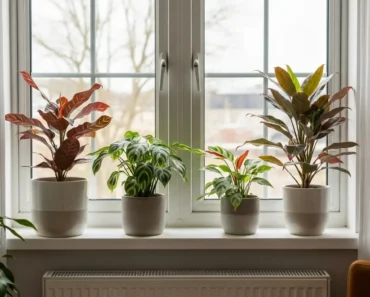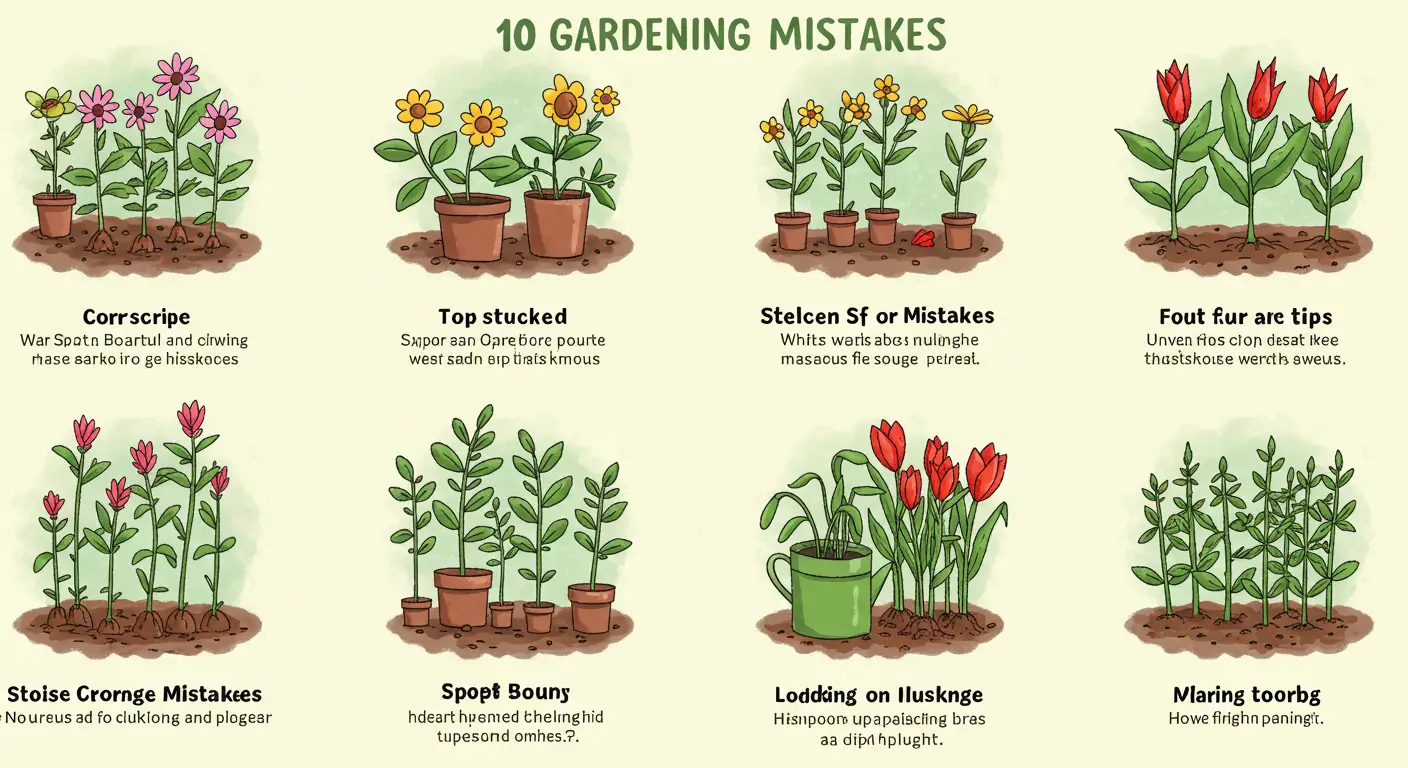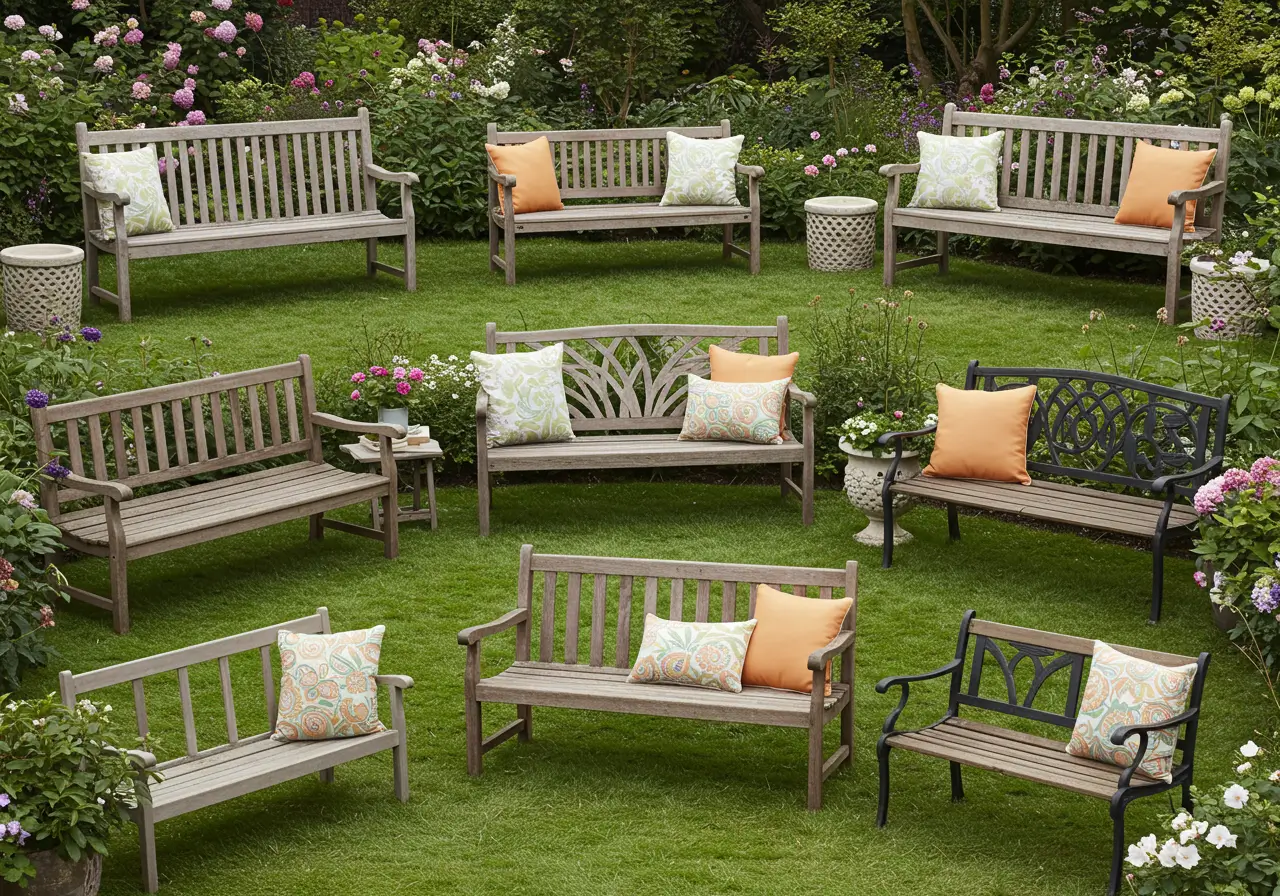What if the metal gate you’re about to buy will rust and fail within five years because you didn’t know which finish to choose for UK weather?
Thousands of UK property owners waste money on gates that look impressive in the showroom but deteriorate rapidly in British rain and humidity. The difference between a gate lasting 10 years versus 40 years often comes down to decisions about materials and finishes that most buyers don’t understand until it’s too late.
For property owners across the United Kingdom, selecting the right gate represents a fundamental decision impacting security, privacy, and aesthetic appeal for decades to come. Among the various options available, the metal gate stands out as an essential choice, valued for its inherent strength, exceptional longevity, and remarkable versatility in design applications.
From securing driveways against unauthorized access to defining garden boundaries with elegant charm, metal gates offer reliable and stylish solutions perfectly suited to the UK’s diverse architectural heritage and often challenging climate conditions. British weather—characterized by frequent rain, high humidity, temperature fluctuations, and coastal salt exposure in many areas—demands gates that can withstand these harsh elements without constant maintenance or premature failure.
Choosing an essential metal gate means investing in more than just an entrance or boundary marker. You’re enhancing your property’s character and curb appeal while providing robust protection against intruders. Whether you need a sturdy driveway gate offering peace of mind, an elegant metal garden gate adding charm to your outdoor space, or a security-focused side gate protecting vulnerable access points, understanding the key factors that contribute to quality and suitability proves crucial for making a wise, long-lasting investment.
This comprehensive guide delves into the essentials of selecting metal gates specifically for the UK market. We’ll explore why metal remains such a popular choice among British property owners, the different types available for various applications, crucial considerations like materials and weather-resistant finishes needed to withstand our climate, popular styles complementing UK architecture, vital installation requirements, and practical maintenance advice. Equip yourself with the knowledge to choose an essential metal gate that perfectly balances function and form for your property.
Why Choose Metal Gates in the UK?
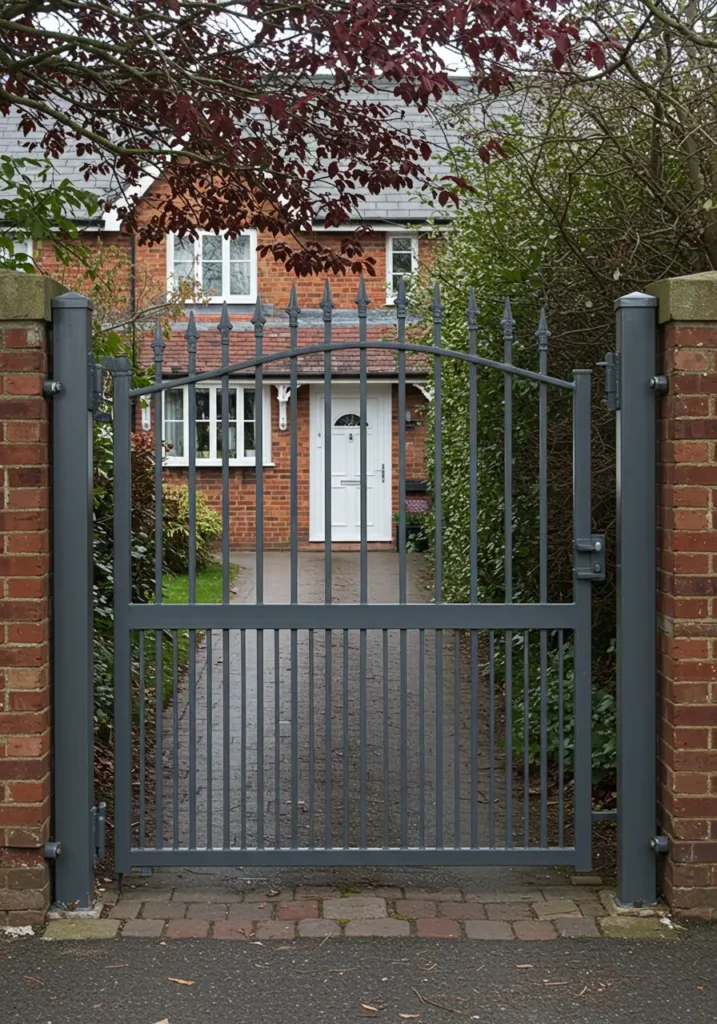
The enduring popularity of metal gates across Britain isn’t accidental or merely traditional. These gates offer a compelling package of benefits perfectly suited to the specific demands of UK properties and our notoriously unpredictable weather conditions.
Unmatched Durability and Longevity
First and foremost, metal gates deliver exceptional durability and longevity that simply outperforms alternative materials in British conditions. Properly specified and finished metal gates—typically manufactured from steel or aluminum—can withstand decades of wind, rain, frost, snow, and summer sun exposure. Unlike timber gates, which require frequent treatment with preservatives and paint to prevent rot, warping, and splitting in the UK’s damp climate, metal offers superior structural integrity over the long term when adequately protected against corrosion.
A quality steel gate with hot-dip galvanizing and powder coat finish can easily last 30-50 years with basic maintenance. Compare this to wooden gates that might need replacing every 10-15 years despite regular treatment, and the long-term value proposition becomes clear. While the initial investment in metal may be higher than basic timber options, the extended lifespan and reduced maintenance requirements make metal gates more cost-effective over their lifetime.
Superior Security and Peace of Mind
Security ranks as a major factor driving UK homeowners toward metal gates. A well-constructed metal gate presents a formidable physical barrier that deters opportunistic criminals and prevents unauthorized access. The inherent strength of steel or aluminum frameworks combined with robust locking mechanisms creates a security solution far superior to wooden alternatives that can be more easily forced or damaged.
Metal’s resistance to being kicked in, sawed through, or otherwise compromised provides genuine peace of mind for homeowners concerned about property security. This proves particularly valuable for driveway gates preventing vehicle theft or unauthorized parking, and for side gates protecting vulnerable access points alongside properties—common entry routes for burglars in UK towns and cities.
The psychological deterrent effect matters too. Visible metal gates signal to potential intruders that a property is well-protected, often causing them to move on to easier targets. This deterrent value extends beyond the physical strength to include the perception of security that metal gates project.
Aesthetic Versatility for UK Architecture
Britain’s architectural diversity—ranging from Georgian townhouses and Victorian terraces to Edwardian villas, country cottages, mid-century suburban homes, and contemporary new-builds—requires gate solutions that can complement vastly different styles. Metal’s aesthetic versatility allows manufacturers to create gates suiting virtually any UK architectural style or personal preference.
For period properties, traditional wrought iron-style gates with ornate scrollwork, decorative finials, and arched tops provide authentic character. Modern homes benefit from clean-lined contemporary designs featuring horizontal slats, geometric patterns, and minimalist aesthetics. Country properties might choose rustic metal designs with nature-inspired motifs. This range ensures you can find or commission a metal gate that enhances rather than conflicts with your property’s existing architectural language.
Metal also accommodates various finish colors. While traditional black remains popular and suits most UK properties, dark greens work beautifully with country settings, anthracite grey complements modern architecture, and even white or cream finishes can suit specific design schemes. This color flexibility allows precise aesthetic matching to your property’s character.
Low Maintenance Requirements
Once correctly finished with protective coatings, metal gates require minimal upkeep compared to wood, freeing up valuable time while maintaining attractive appearances. Wooden gates demand annual or bi-annual treatment with preservatives, stains, or paints to prevent deterioration in UK weather. This represents both time investment and ongoing material costs.
Quality metal gates need only occasional cleaning with soap and water, periodic inspection for finish damage, and prompt touch-ups of any chips or scratches that could allow rust to start. Hinges and locks require periodic lubrication. This maintenance schedule takes hours annually rather than the many hours required for wooden gate upkeep. For busy homeowners, this low-maintenance characteristic alone often justifies choosing metal over wood.
Question for you: What’s your primary motivation for choosing a metal gate—security concerns, longevity, low maintenance, or aesthetic appeal? Understanding your priorities helps you make better decisions about materials and features. Share your thoughts in the comments below!
Essential Types of Metal Gates for UK Properties
Metal gates serve various functions around UK properties, each with specific requirements and considerations. Understanding the common types helps you select the right solution for each particular need and location on your property.
Driveway Gates
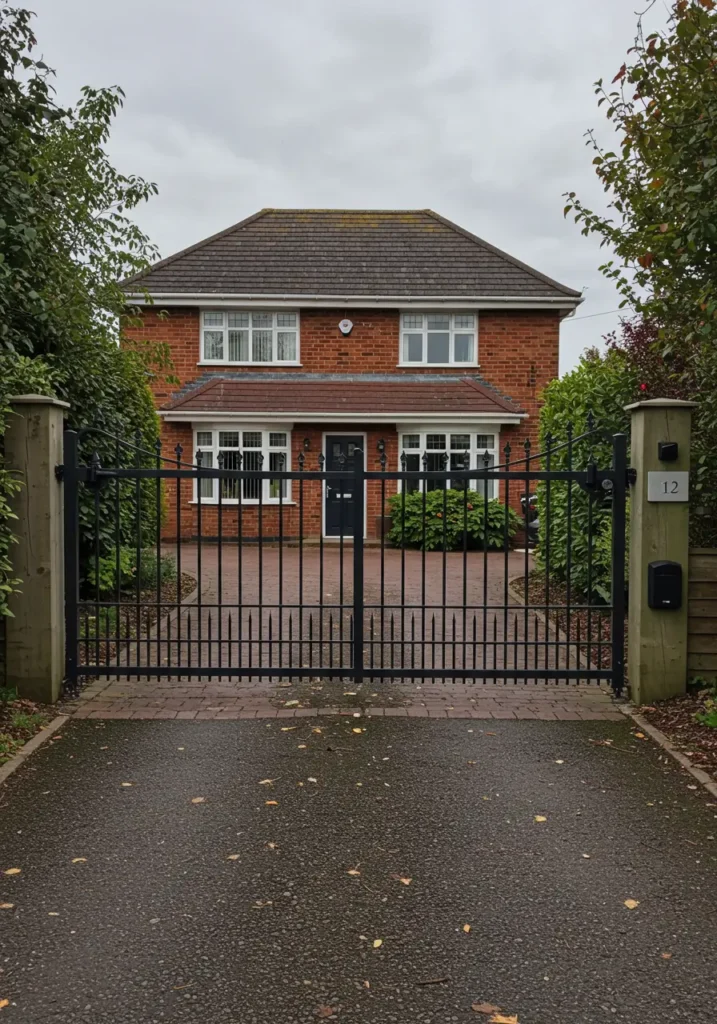
Driveway gates represent the largest and most security-focused gate type, controlling vehicular access to your property. They serve multiple essential functions: preventing unauthorized parking on your drive (a significant issue in many UK areas), deterring vehicle theft, enhancing privacy, and creating an impressive entrance that boosts curb appeal and property value.
Double Swing Gates
Double swing gates offer a popular choice among UK homeowners, providing a classic, symmetrical appearance that suits many property styles. This configuration distributes the gate’s weight across two posts rather than one, reducing stress on individual mounting points. Each gate leaf typically spans 1.5 to 2.5 meters, creating total opening widths of 3-5 meters that accommodate most UK driveways.
Double swing gates work best on level or gently sloping driveways with adequate clearance for the gates to swing open fully—typically requiring at least the width of one gate leaf as clear space beyond the opening. Wind loading considerations matter in exposed locations, as the UK’s weather can catch fully open gates like sails. Quality hinges and, potentially, gate stays or stops prevent wind damage.
Single Swing Gates
Single swing gates suit narrower driveways but require more substantial posts and hinges to support the full weight on one side. They need ample swing room—the full gate width must be clear of obstructions like parked cars, planters, or walls. Single gates work well where double gates would be disproportionate or where you want to maintain some separation (perhaps keeping one side permanently closed with a pedestrian gate alongside).
Sliding Gates
Sliding gates offer ideal solutions for UK properties with limited swing space, which describes many urban and suburban locations with tight driveways. They’re also advantageous on sloped driveways where swing gates might scrape the ground or be difficult to level. Two main types exist:
Cantilever sliding gates represent the premium option. The gate suspends from a track-and-roller system alongside the opening rather than sliding on ground tracks. This avoids issues with ground tracks collecting leaves, debris, ice, or snow—significant advantages in British conditions. While more expensive initially, cantilever systems require less maintenance and operate more reliably in UK weather.
Tracked sliding gates run on rails installed in the ground. While less expensive than cantilever systems, ground tracks require regular clearing of debris and can be affected by frost heave or ice formation. They work acceptably in sheltered locations or where regular maintenance is feasible.
Sliding gates require clear space alongside the driveway equal to the gate width for the gate to fully retract. Ensure your property boundary accommodates this before committing to a sliding design.
Metal Garden Gates
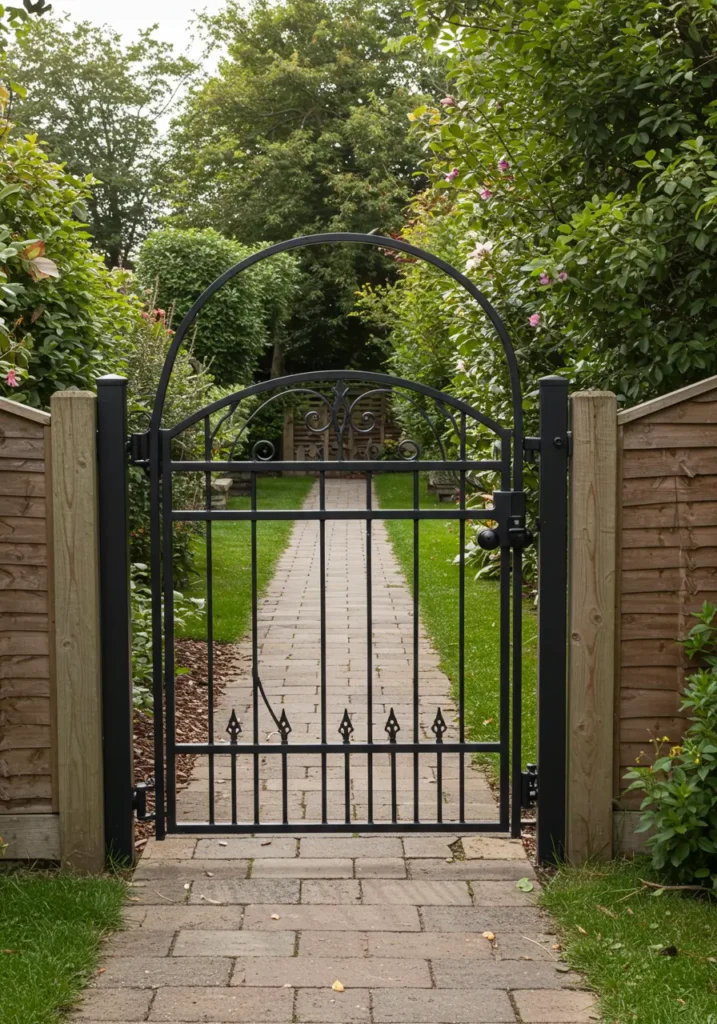
An essential feature for defining boundaries and securing garden spaces, the metal garden gate balances security with aesthetic charm. These gates control pedestrian access to front gardens, back gardens, patio areas, kitchen gardens, or allotment plots while contributing to the overall landscape design.
Design Considerations for Garden Gates
Garden gates typically measure between 900mm to 1200mm (3-4 feet) in height, lower than security-focused gates but sufficient for boundary definition and preventing casual access. Width usually matches standard pathway dimensions of 900mm to 1000mm for single pedestrian passage.
Aesthetic appeal ranks highly for garden gates as they often serve as focal points in landscape design. Popular UK garden gate styles incorporate gentle curves, arched tops, nature-inspired motifs (leaves, birds, flowers), and decorative scrollwork that adds character without being overly ornate. These elements create welcoming entrances that enhance rather than dominate garden settings.
While security may be secondary to aesthetics for some garden gates, consider your specific needs. Front garden gates might require more security features than back garden gates in secure rear yards. Areas with allotment plots or visible tool storage benefit from gates with better security provisions.
Matching Garden Character
A well-chosen metal garden gate complements your garden’s style. Cottage gardens suit traditional designs with curves and decorative elements. Contemporary gardens pair well with clean-lined modern gates. Formal gardens benefit from symmetrical, classic designs. This aesthetic harmony ensures your gate enhances rather than disrupts your garden’s overall ambiance.
Side Gates and Alley Gates
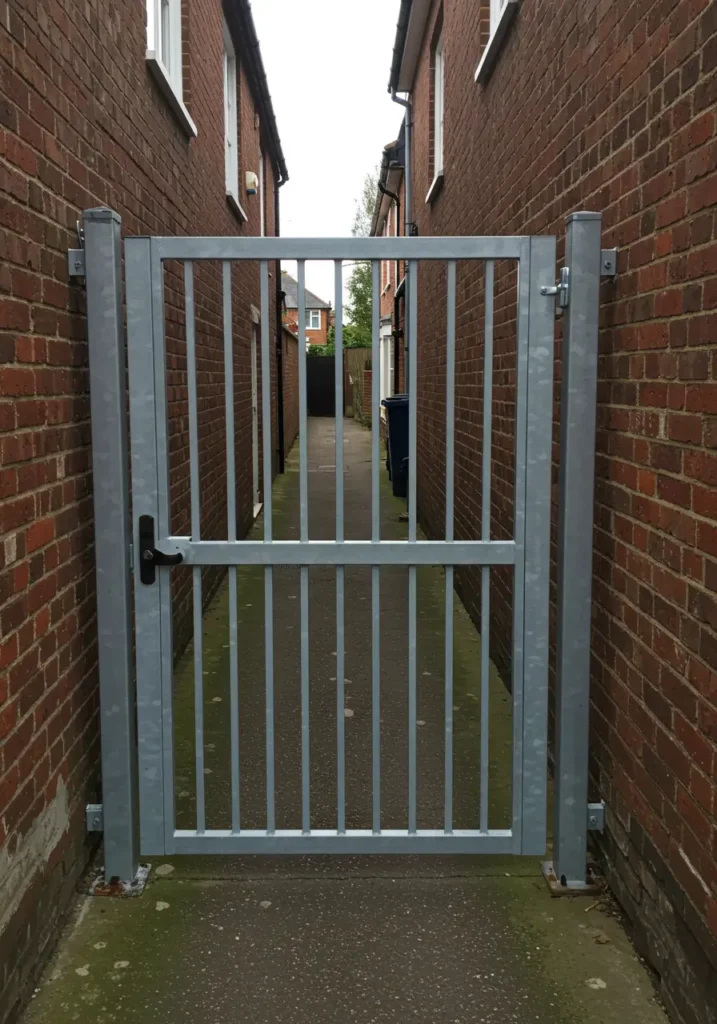
Side gates and alley gates secure vulnerable access points alongside houses or down shared alleyways—common features in UK towns and cities. These passages provide rear access but also represent potential security weak points that burglars often target. Security and privacy become primary concerns for these essential metal gates.
Security-First Design
Side gates typically stand taller than garden gates—often 1.8 meters (6 feet) or higher—to prevent climbing. They may feature solid panels, closely spaced vertical bars that prevent squeezing through or gaining footholds, and pointed tops that deter climbing attempts. The goal is creating barriers that can’t be easily scaled or breached.
Robust locking mechanisms prove essential for side gates. Consider mortise deadlocks, surface-mounted security locks with hardened shackles, or even electronic keypads for keyless security. Ensure locks engage both sides of the gate frame to prevent forcing. Some homeowners add secondary bolts at top and bottom for additional security.
Durability in Harsh Conditions
Side passages and alleyways often create harsh micro-climates—shadowy, damp, with limited air circulation. These conditions accelerate corrosion if gates aren’t properly protected. Premium finishes become even more important for side gates than gates in more exposed, better-ventilated locations. Galvanizing plus powder coating offers the best protection in these challenging environments.
Alley gates serving multiple properties face potential misuse or rough treatment. Specify heavy-duty construction with reinforced frames, substantial hinges, and impact-resistant locks that can withstand the occasional knock from wheelie bins or careless handling.
Pedestrian Gates
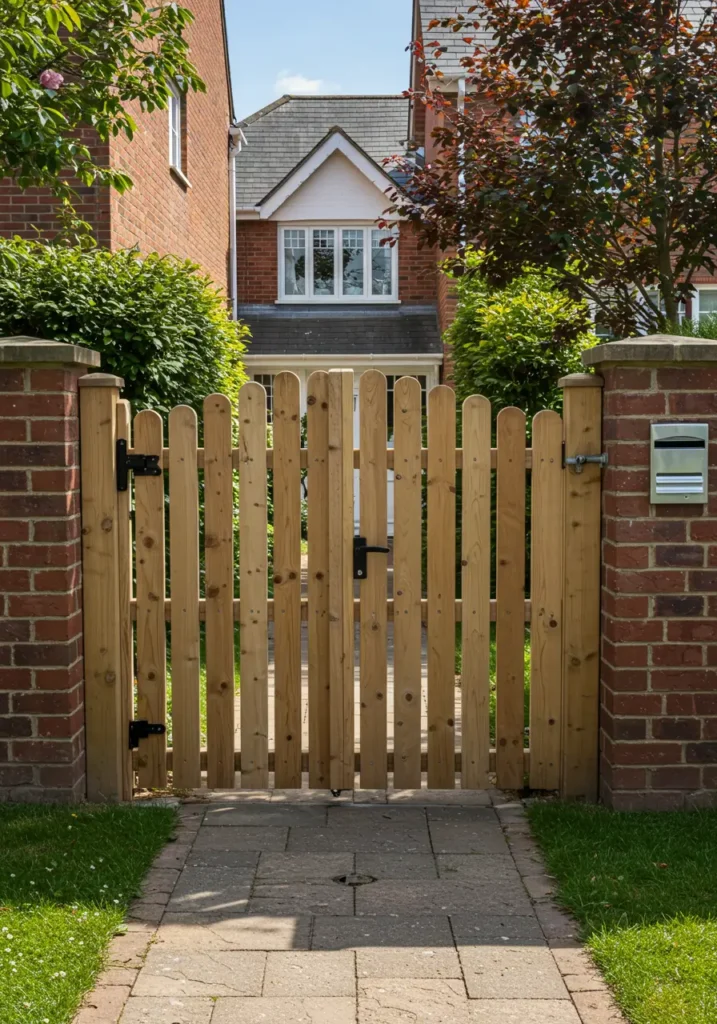
Pedestrian gates control foot traffic along main pathways to front doors, typically integrated with fencing or walls surrounding front gardens. These gates need to balance security requirements with creating positive first impressions for visitors while providing convenient daily access for residents.
Height and Style Considerations
Standard pedestrian gates range from waist-high (900mm-1000mm) to chest-high (1200mm-1400mm). Lower gates feel more welcoming and open while taller gates provide more privacy and security. Choose heights that coordinate with adjacent fencing or walls for visual continuity.
Style should complement your home’s architecture while remaining functional. Traditional properties might choose gates with period-appropriate details. Modern homes benefit from contemporary designs. The gate’s design language should feel cohesive with your property’s overall aesthetic rather than jarring or out of place.
Let’s discuss: Which type of gate represents your primary need—driveway security, garden access, side passage protection, or front entrance aesthetics? Different applications have vastly different requirements. Share which gate type you’re researching and your main concerns in the comments!
Key Considerations for Essential Metal Gates
Selecting an essential metal gate requires careful thought extending beyond just type and style preferences. Several critical factors determine your gate’s performance, longevity, and suitability for your specific UK property and local conditions.
Material Matters: Steel vs. Aluminium vs. Wrought Iron
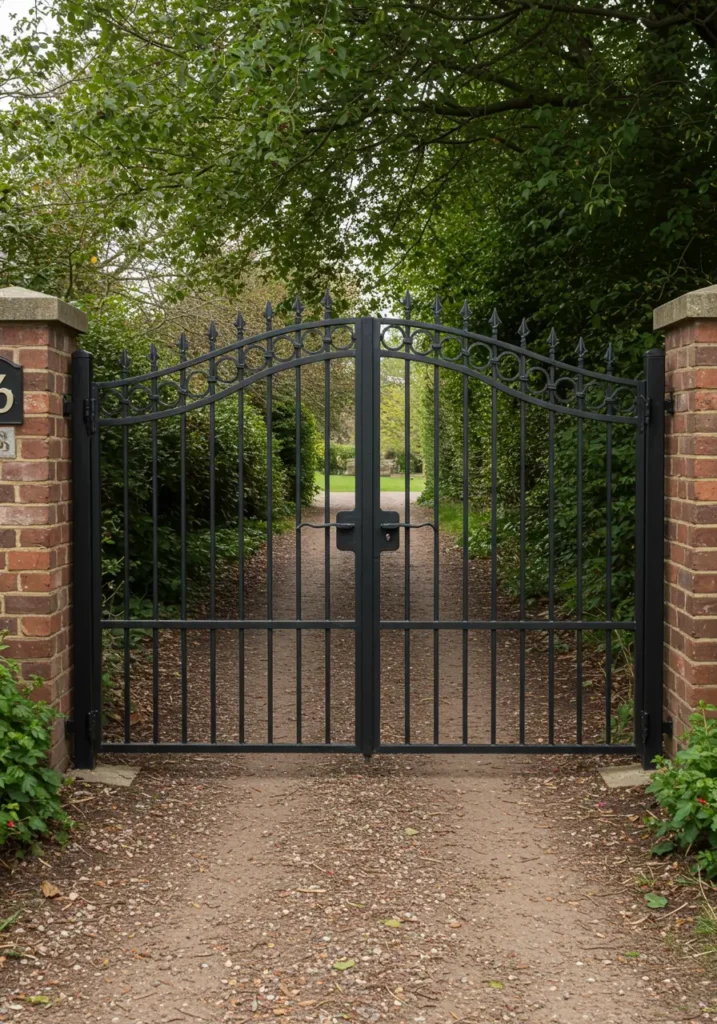
The base metal material profoundly affects your gate’s characteristics, performance, and maintenance requirements. Understanding these differences helps you make informed choices matching your priorities and budget.
Steel: The Versatile Workhorse
Steel represents the most common choice for UK metal gates due to its compelling combination of strength, versatility, and relative affordability compared to alternatives. Mild steel offers excellent tensile strength, allowing fabrication of gates that withstand impacts, wind loading, and daily use without bending or deforming. This strength permits designs ranging from simple functional gates to elaborate decorative styles incorporating scrollwork and fine details.
Steel’s main drawback involves susceptibility to rust when exposed to moisture and oxygen—abundant in British weather. This makes protective finishing absolutely critical. Unfinished or poorly finished steel gates will quickly develop rust that compromises both appearance and structural integrity. However, properly finished steel (galvanized then powder coated) performs excellently in UK conditions, outlasting most alternative materials.
Steel’s weight provides advantages and disadvantages. Heavier gates feel substantial and secure but require robust posts, strong hinges, and potentially automation systems with higher weight capacities. For pedestrian gates, weight is manageable; for large driveway gates, factor installation and hardware costs accordingly.
Aluminium: Lightweight Rust Resistance
Aluminium gates offer significantly lower weight than steel—often 50-60% lighter for comparable sizes. This reduced weight simplifies installation, reduces stress on posts and hinges, and allows for very wide automated gates without requiring industrial-grade motors. Aluminium’s natural corrosion resistance proves valuable in coastal areas where salt-laden air accelerates steel corrosion, or in particularly damp locations.
However, aluminium is less strong than steel per unit of material. To achieve comparable strength, aluminium gates require thicker material or more substantial construction, which increases costs. Aluminium also dents more easily than steel, though it won’t rust. For high-security applications or areas with potential impacts, steel’s superior strength often makes it preferable despite aluminium’s rust resistance.
Aluminium gates cost more than comparable steel gates due to material prices. This premium buys you rust resistance and reduced weight but not greater strength. Evaluate whether these advantages justify the additional expense for your specific situation.
Wrought Iron: Authentic Heritage or Steel Alternative
Genuine wrought iron represents traditional ironwork material prized for its distinctive grain structure and historical authenticity. True wrought iron is now rare and expensive, produced by only a handful of specialized smiths in the UK. It offers unique character and can be worked in traditional forging methods that create authentic period detailing impossible in modern steel.
Most gates marketed as “wrought iron” or “wrought iron style” in today’s UK market are actually fabricated from mild steel. Modern steel can be worked to closely mimic traditional wrought iron appearance through forging, welding, and finishing techniques. This steel alternative provides the traditional aesthetic at a fraction of genuine wrought iron’s cost while offering equal or superior durability when properly finished.
Unless you’re restoring a listed building or have specific requirements for authentic materials, steel fabricated in traditional styles offers the best value. It delivers the desired appearance with modern reliability and protection when galvanized and powder coated.
Finishes for UK Weather Protection
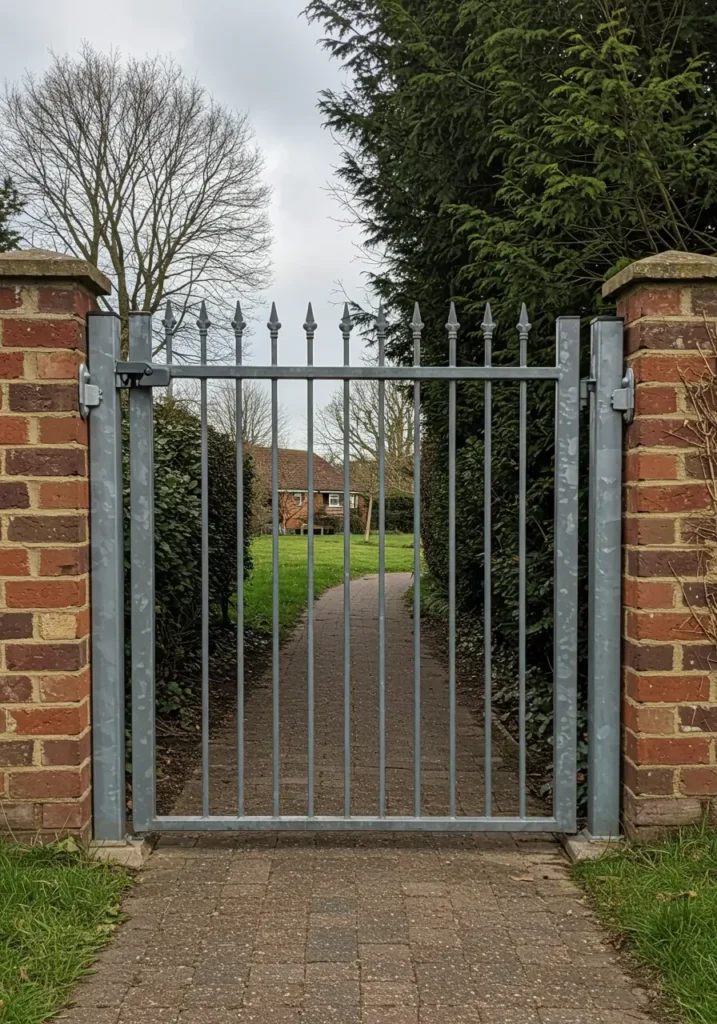
This consideration arguably ranks as the single most critical factor for gate longevity in the UK’s damp, variable climate. Inferior or improperly applied finishes will fail within a few years, leading to rust that compromises both appearance and structural integrity. Never compromise on finish quality regardless of budget pressures elsewhere.
Hot-Dip Galvanizing: Essential Foundation
Hot-dip galvanizing provides the best underlying rust protection available. The process involves immersing fabricated steel gates in molten zinc (approximately 450°C), creating a metallurgically bonded zinc coating that becomes integral with the base steel. This zinc layer acts as a sacrificial anode—it corrodes preferentially to the steel, protecting the underlying metal even if the coating is scratched or damaged.
Galvanized coating thickness matters. Standards like BS EN ISO 1461 specify minimum coating thickness based on material thickness. Quality gate manufacturers use galvanizing meeting or exceeding these standards. Properly galvanized steel gates can last 20-30 years or more without rust issues even in challenging UK coastal or industrial environments.
Galvanizing’s dull grey appearance isn’t always aesthetically pleasing, which is why most gates receive additional topcoats. However, galvanizing provides the crucial foundation that ensures longevity. Never accept ungalvanized steel gates for outdoor UK use regardless of how attractive the paint finish appears—they will rust prematurely.
Powder Coating: Durable, Attractive Topcoat
Powder coating represents the optimal topcoat finish over galvanized steel. This process involves electrostatically applying dry powder (thermosetting plastic) to the metal, then curing it in an oven at approximately 200°C. The powder melts and flows, creating a smooth, uniform, highly durable finish far superior to conventional painting.
Powder coat finishes resist chipping, scratching, fading, and weathering better than liquid paints. They provide excellent UV resistance, maintaining color consistency despite Britain’s summer sun (when it appears). The hard, non-porous finish resists moisture penetration, providing an additional barrier protecting the underlying galvanized steel.
RAL color standards allow precise color matching. Popular UK gate colors include RAL 9005 (jet black), RAL 6005 (moss green), RAL 7016 (anthracite grey), and RAL 9010 (pure white). Discuss color options with your supplier to find shades complementing your property.
The combination of galvanizing plus powder coating provides layered protection. Even if the powder coat is damaged, the galvanizing underneath prevents rust. This redundancy ensures long-term performance in demanding British weather.
Quality Paint Systems: Alternative Protection
If painted rather than powder coated, insist on professional multi-coat paint systems specifically designed for exterior metal in harsh environments. Proper paint systems require thorough surface preparation (removing all rust, mill scale, and contaminants), application of zinc-rich or zinc phosphate primer providing rust inhibition, followed by at least two coats of high-performance exterior metal paint.
Quality metal paints include products from manufacturers like Hammerite, Dulux Weathershield, and Rust-Oleum. These formulations provide much better weather resistance than general-purpose paints. However, even the best paint systems require more maintenance than powder coating—expect to repaint every 5-10 years depending on exposure and care.
DIY painting rarely achieves professional results. The surface preparation phase is critical and labor-intensive. Professional painters have the equipment, experience, and knowledge to properly prepare and coat gates for maximum durability.
Security Features Integration
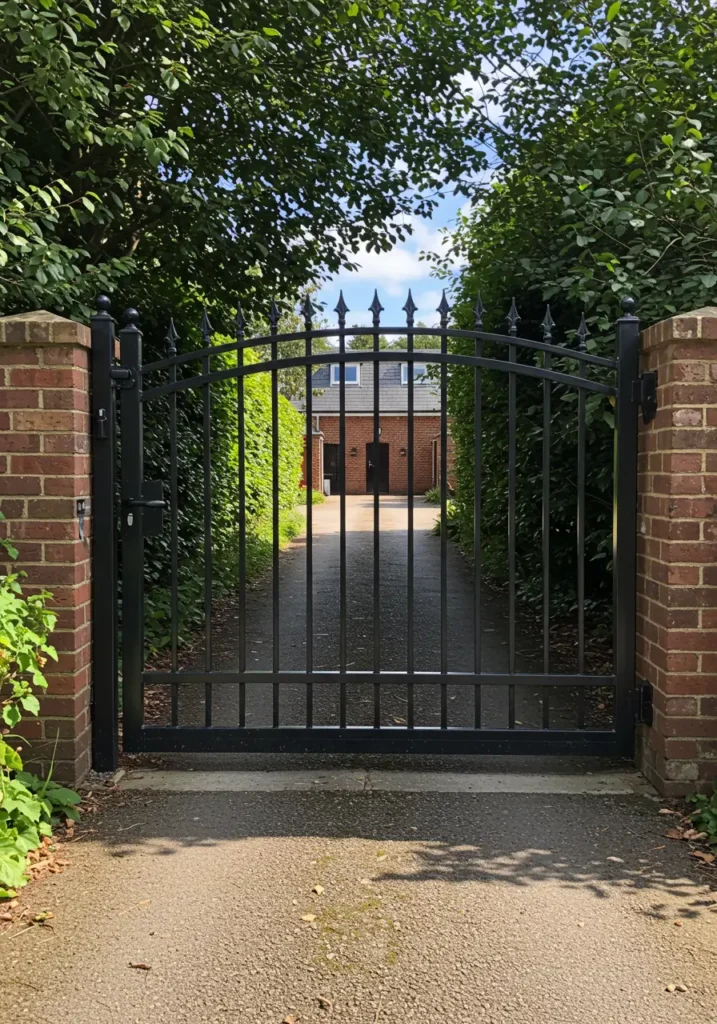
The level of security you require depends on your property’s location, local crime rates, what you’re protecting, and your personal risk tolerance. Different applications demand different security provisions.
Locking Mechanisms
Lock choices range from simple to sophisticated:
Slide bolts and latches provide basic security suitable for low-risk applications like internal garden gates. They’re simple, reliable, and inexpensive but offer minimal security against determined intruders.
Mortise locks integrate into the gate structure, providing better security than surface-mounted options. Look for five-lever mortise deadlocks meeting British Standard BS3621 for insurance-grade security on important gates.
Rim locks mount on the gate surface. Quality options with hardened steel cases and shackles provide good security while being easier to install than mortise locks.
Electronic keypads eliminate keys that can be lost, stolen, or copied. Program multiple access codes for different users. Battery or mains-powered options exist. Ensure weather-resistant keypads rated for outdoor UK use.
Smart locks integrate with home automation systems, allowing remote control via smartphone apps. Monitor access, grant temporary access to visitors, and receive alerts when gates open or close.
Design-Based Security
Beyond locks, gate design influences security:
Height: Gates over 1.8 meters (6 feet) deter climbing. For maximum security, consider heights up to 2.4 meters where permitted.
Pointed tops: Spear points, fleur-de-lis finials, or other pointed decorative tops make climbing painful and difficult.
Bar spacing: Closely spaced vertical bars (no more than 100mm apart) prevent intruders from squeezing through or gaining footholds for climbing.
Solid panels: Full or partial solid panels prevent visual surveillance of your property while eliminating all footholds. They reduce wind resistance concerns compared to fully solid gates.
Automation for Convenience and Security
Automated gates enhance both convenience and security, particularly for driveway applications. You can open gates from your vehicle via remote control, avoiding exposure to weather or potential threats. Automation allows controlled access via intercoms, keypads, or smartphone apps while maintaining closed gates that deter casual trespassers.
Modern gate automation systems include safety features like obstacle detection, automatic reversal if obstructions are sensed, and emergency manual release. Ensure any automation meets current UK safety standards to prevent accidents.
Size, Fit, and Site Considerations
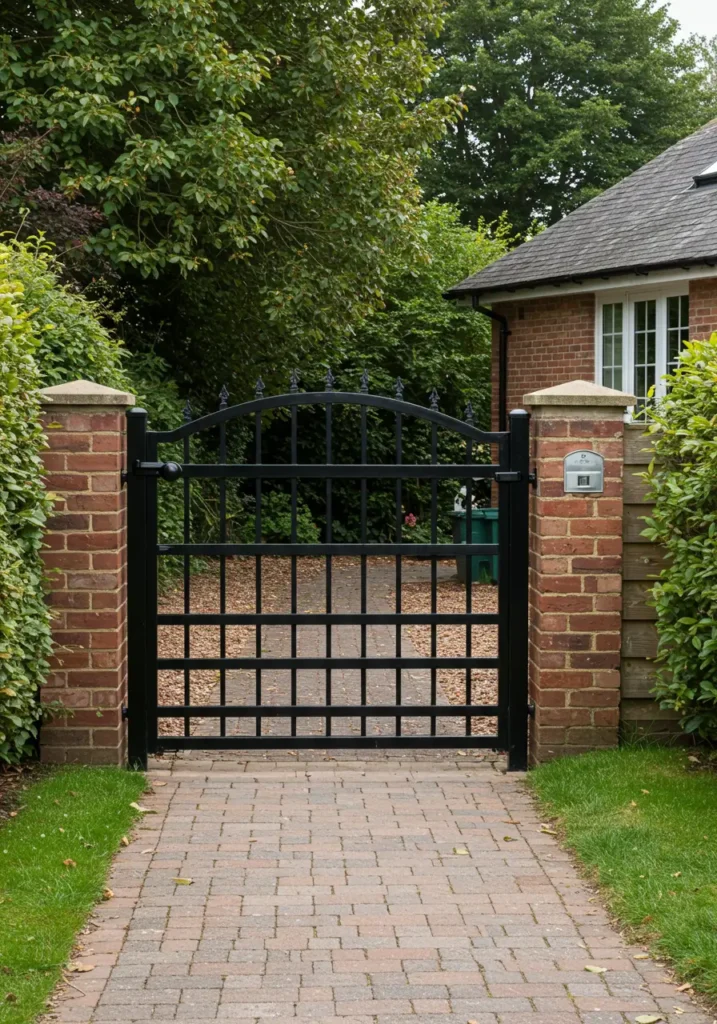
Accurate measurement and site assessment prevent costly mistakes and ensure your gate functions properly once installed.
Measuring for Gates
Measure your opening width at multiple heights to account for any irregularities. For gates between walls or posts, measure the actual clear opening width, not the wall-to-wall distance. Gates need to fit within the opening with small clearances (typically 10-20mm each side) for hinges and operation.
Measure height from the lowest ground point to your desired gate height. Account for ground slopes—gates need clearance underneath to swing or slide without scraping.
For new openings, consider standard UK gate sizes when possible. Common pedestrian gate widths include 900mm, 1000mm, and 1200mm. Standard single driveway gate widths range from 3000mm to 4000mm. Using standard sizes reduces costs compared to fully bespoke gates.
Ground Conditions
Assess ground level and slope. Sloping driveways create challenges for swing gates that may scrape the ground or hang unevenly. Solutions include rising hinges that lift gates slightly as they open, or choosing sliding gates instead.
Uneven ground near posts requires special attention. Posts must remain vertical even if ground slopes. Adequate foundation depth prevents movement. In soft or unstable ground, larger concrete footings or deeper setting may be necessary.
Swing Clearance
Verify adequate clear space for swing gates to open fully. Measure from the hinge side across the arc the gate will travel, ensuring no walls, posts, parked vehicles, or landscaping obstruct the swing path. Account for overhangs from vehicles that might clip partially opened gates.
Slide Space
Sliding gates require clear space alongside the opening equal to the gate width plus approximately 10-15%. Verify your property boundary extends far enough and that no obstacles (utility boxes, drainage gullies, trees) occupy this space. For cantilever gates, ensure adequate area for the rear support structure.
Also Read: A UK Guide to Choosing Benches Garden Bench Styles
Popular Metal Gate Styles in the UK
Metal’s versatility in fabrication allows for a wide range of styles ensuring there’s an essential metal gate design to suit almost any UK property aesthetic, from historic to ultra-modern.
Traditional & Ornate Styles
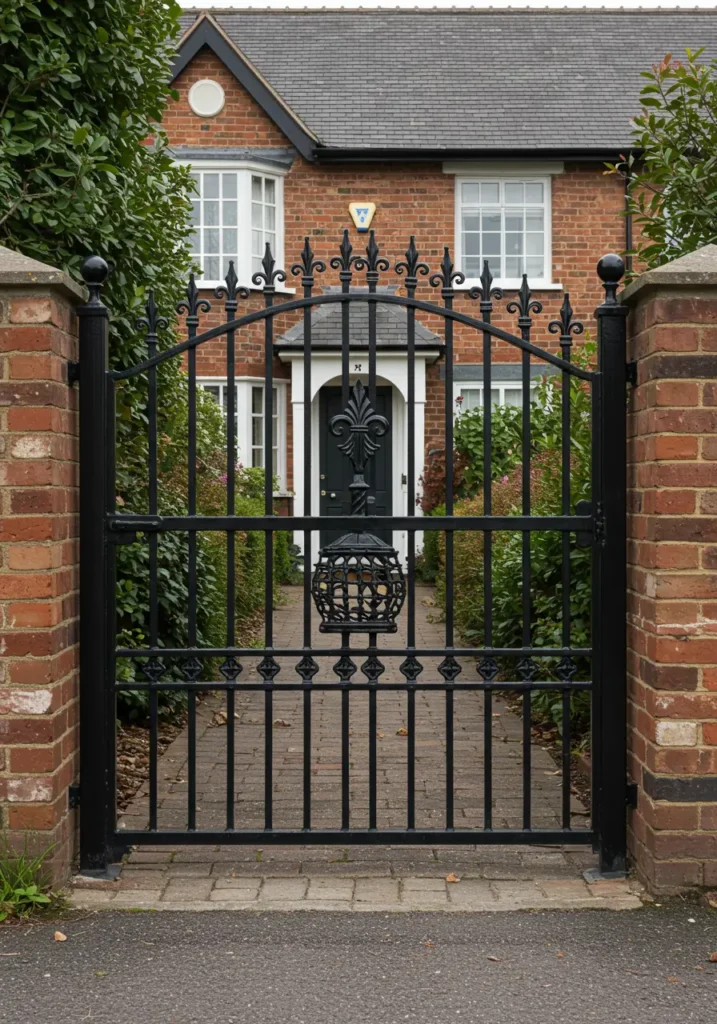
Reflecting Britain’s rich architectural heritage spanning centuries, traditional and ornate gate styles celebrate craftsmanship and decorative metalwork. These designs complement period properties—Victorian terraces, Edwardian villas, Georgian townhouses, country cottages—while adding character to newer builds seeking traditional appeal.
Key Design Elements
Scrollwork: Ranging from simple C-scrolls and S-scrolls to elaborate interwoven patterns creating visual rhythm and movement. Traditional scrolls were hand-forged; modern versions are often machine-formed but achieve similar aesthetic effects.
Finials: Decorative tops on vertical bars, including spear points, ball tops, fleur-de-lis, acorns, and custom designs. Finials add vertical interest while providing security benefits through pointed tops.
Arched tops: Gentle curves or pronounced arches soften gate profiles while echoing architectural elements like arched doorways or windows common in period properties.
Decorative collars and baskets: Ornamental bands wrapping vertical bars or basket-like formations create visual interest at rail intersections.
Nature motifs: Stylized leaves, flowers, vines, or birds incorporated into designs connect gates to garden settings while displaying craftsmanship.
Simple & Modern Designs
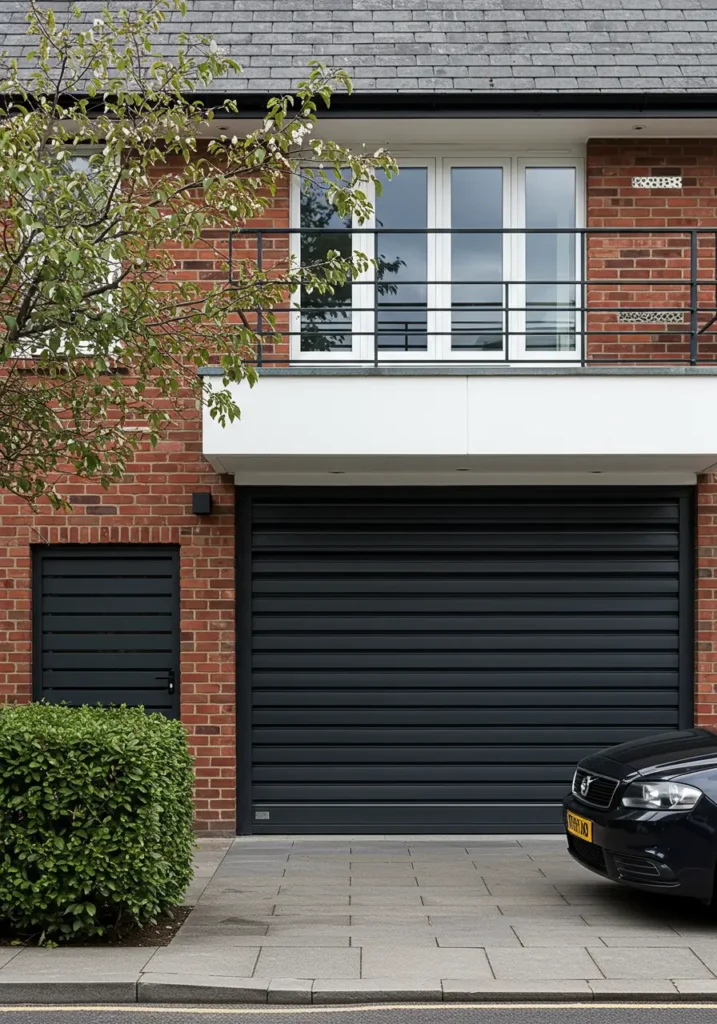
Contemporary UK architecture demands gates with clean, uncluttered aesthetics. Modern designs emphasize simplicity, geometric precision, and functional beauty that complements minimalist or contemporary buildings.
Modern Design Characteristics
Straight lines: Emphasizing vertical or horizontal bars in parallel arrangements creates strong geometric statements. Vertical bars provide traditional security while horizontal slats deliver contemporary flair.
Minimal ornamentation: Rejecting decorative elements in favor of material and form creating visual interest through proportion, rhythm, and shadow play.
Geometric patterns: Incorporating squares, rectangles, or asymmetric arrangements that create modern visual interest without traditional embellishment.
Flat profiles: Using square or rectangular tubing rather than round bars for more architectural, less ornamental appearances.
Monochromatic finishes: Often featuring matte or satin black, anthracite grey, or occasionally white for maximum contemporary impact.
Estate Gates
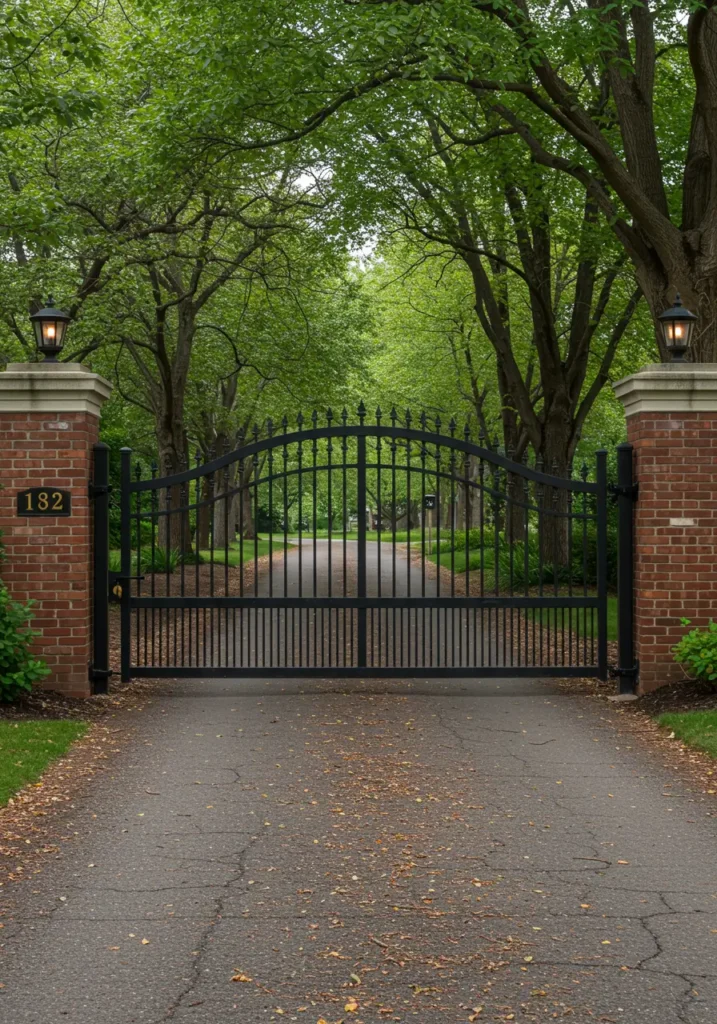
Designed for larger properties, country estates, and substantial driveways, estate gates convey grandeur, status, and serious security. These gates make statements about property importance while providing formidable barriers.
Estate Gate Features
Substantial scale: Heights often reaching 2-2.4 meters create imposing presence. Widths accommodate wide driveways serving multiple vehicles or large vehicles like horse boxes.
Double swing configuration: Typically configured as paired gates creating symmetrical, impressive entrances suitable for estate settings.
Heavy-duty construction: Using substantial frame members and reinforcement to support the larger size and provide security befitting valuable properties.
Style flexibility: Can incorporate traditional ornate elements for period estates or clean modern lines for contemporary country homes.
Automation integration: Almost always automated given their size and weight, often with intercom systems, CCTV integration, and sophisticated access control.
Metal Garden Gate Styles
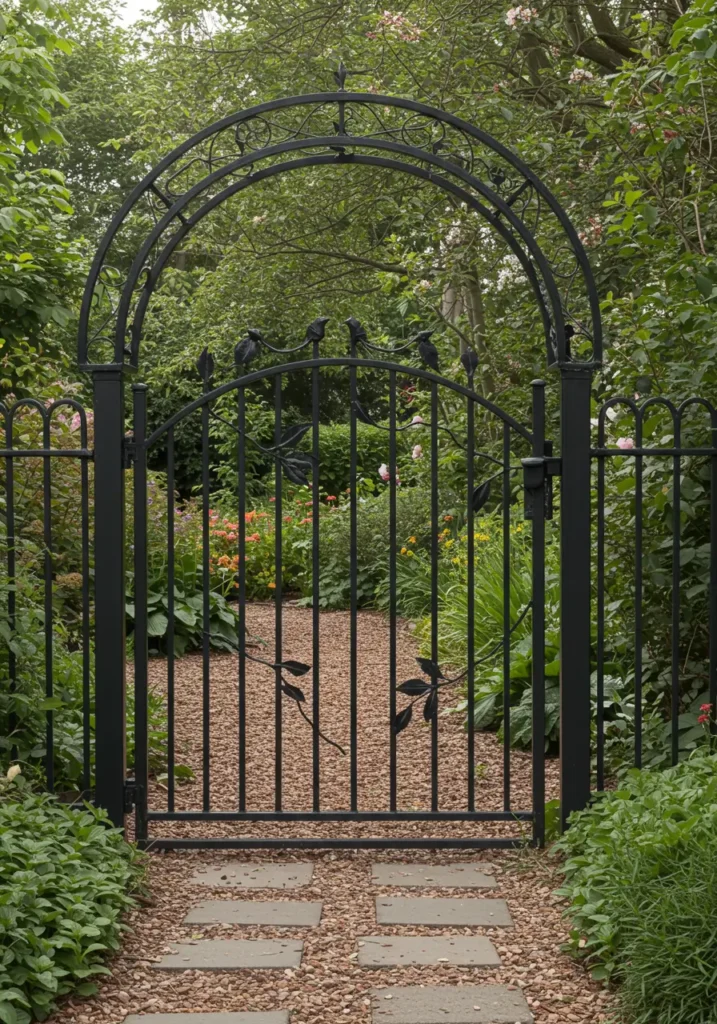
Specifically designed for garden entrances, these gates prioritize charm and aesthetic appeal alongside functional access control. A well-chosen metal garden gate becomes a focal point enhancing garden character.
Garden Gate Characteristics
Appropriate scale: Heights typically 900mm-1200mm (3-4 feet) suit garden settings without creating fortress-like appearances. Width accommodates comfortable pedestrian passage with tools or wheelbarrows.
Welcoming aesthetics: Designs often incorporate curves, arches, or nature-inspired motifs (leaves, birds, flowers, butterflies) connecting gates to garden themes.
Style versatility: Ranging from simple functional gates for kitchen gardens to elaborately decorated gates serving as garden ornaments. Choose styles matching your garden character—cottage gardens suit traditional decorative gates while contemporary gardens pair well with clean-lined modern designs.
Paint and patina options: Beyond standard powder coat finishes, some garden gates feature decorative paint treatments, distressed finishes, or allowed rust patina for rustic aesthetics (when structural integrity isn’t compromised).
Your opinion matters: Which metal gate style appeals to you most—traditional ornate, modern minimal, grand estate, or charming garden designs? Does your property’s architecture dictate style, or are you willing to mix styles for personal preference? Share your style choices and reasoning in the comments!
Professional Installation: Getting it Right
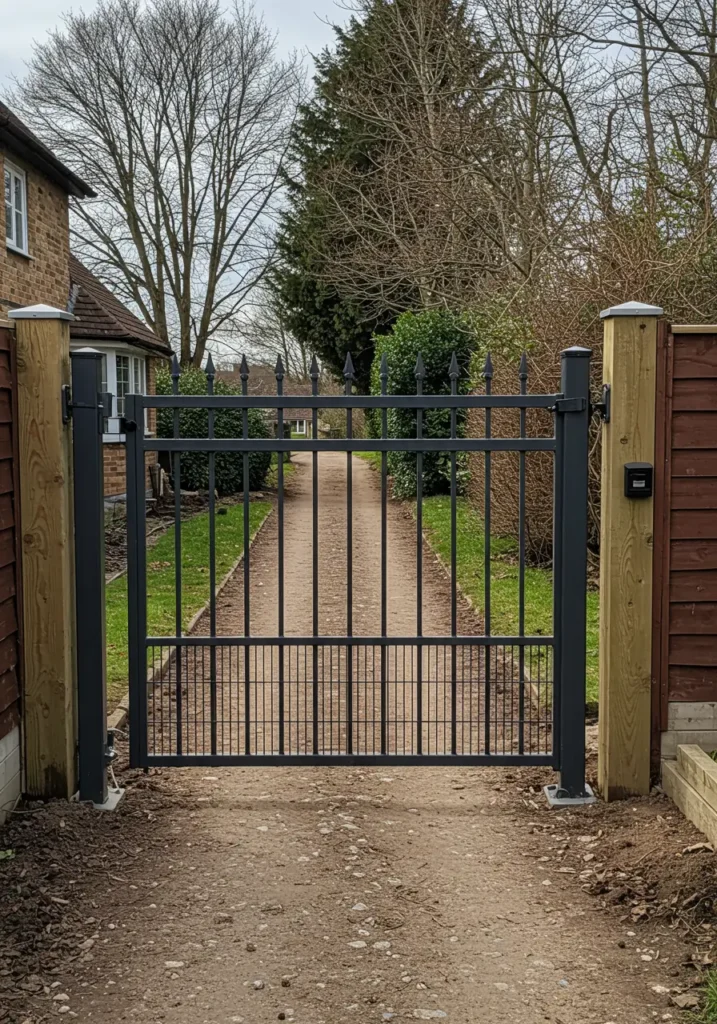
A high-quality essential metal gate can be undermined entirely by poor installation. Ensuring proper fitting proves vital for operation, security, longevity, and safety. While simple garden gates might suit confident DIYers, most metal gate installations warrant professional expertise.
Why Professional Installation Matters
Professional installers bring experience with various gate types, understand local ground conditions, carry proper equipment, and know building regulations and safety standards. They’ve solved problems you haven’t encountered yet, avoiding trial-and-error approaches that waste time and money. For automated gates especially, professional installation ensures safety features function correctly and systems meet UK safety standards.
Professional installation typically includes warranties on workmanship. If problems arise from installation issues, reputable installers will rectify them at no additional cost. This protection proves valuable given that installation problems may not become apparent immediately.
Critical Installation Elements
Posts: The Foundation of Success
Posts must be adequately strong and correctly sized for your gate’s weight and dimensions. Metal posts (typically steel box section or H-section) offer maximum strength and longevity when galvanized. Timber posts work for lighter gates but require pressure treatment to resist rot in UK conditions.
Post sizing matters enormously. Undersized posts will sag, lean, or twist under gate weight and wind loading. Manufacturers typically specify required post sizes for their gates—never use smaller posts than recommended. For heavy driveway gates, posts might measure 100mm x 100mm or larger box section steel or 150mm x 150mm timber.
Concrete Footings: Preventing Movement
Posts must be set in adequate concrete footings to prevent movement, sagging, or leaning over time. Footing depth depends on gate weight, local ground conditions, and frost line depth. UK building standards typically require minimum depths of 600mm for standard gates, increasing to 900mm or more for heavy driveway gates or in soft ground.
Footing width should be at least 3 times the post width. For a 100mm post, footings should extend at least 300mm in all directions from the post center. In frost-prone areas or poorly draining soil, deeper footings prevent frost heave that can crack concrete and shift posts.
Quality concrete mix matters. Use minimum C20/25 grade concrete or bagged post mix following manufacturer instructions. Allow concrete to fully cure (typically 7 days) before hanging gates on posts to prevent movement under load.
Perfect Alignment: Critical for Operation
Gates must be installed perfectly level and plumb (vertical). Even small misalignment causes operational issues—swing gates may not close properly, sliding gates might bind or jump tracks, locks may not engage, and gates will wear prematurely.
Professional installers use laser levels and precise measuring tools to ensure accuracy. DIY installers should invest time in careful measurement and checking—shortcuts here guarantee problems later.
Hardware and Automation
Hinges must be appropriately sized and rated for your gate’s weight. Undersized hinges will sag or fail prematurely. Install hinges plumb and at proper spacing (typically top, bottom, and sometimes middle for heavy gates).
Latches and locks must align precisely for smooth operation. Test extensively before considering installation complete.
Automated gates require electrical wiring (complying with UK wiring regulations), motor mounting, and safety feature installation (photocells detecting obstacles, safety edges on leading gate edges). All automation must meet current UK safety standards (BS EN 12453 for powered gates). Poor automation installation creates serious safety hazards—professional installation is essential.
DIY vs. Professional Installation
Simple pedestrian or lightweight metal garden gate installation might suit competent DIYers with proper tools, some experience, and patience. However, heavy driveway gates, automated systems, gates requiring specialized posts or foundations, or any installation where you’re uncertain about any aspect warrants professional help.
Professional installation costs typically range from £200-500 for simple pedestrian gates to £1000-2500+ for automated driveway gates, depending on complexity and location. While this represents significant expense, it ensures safe, proper installation and often saves money compared to fixing DIY mistakes.
Maintaining Your Metal Gate for Maximum Longevity
Essential metal gates with quality finishes qualify as low-maintenance, but not zero-maintenance. Simple regular care preserves appearance and function for decades, particularly important in the UK’s damp, changeable climate.
Routine Cleaning Schedule
Wash your gate at least annually, or twice yearly in exposed, polluted, or coastal locations. Use mild soap or car shampoo mixed with water, applying with soft cloths or non-abrasive brushes. Work from top to bottom, ensuring you reach all surfaces including backs of bars and hidden areas where dirt accumulates.
Focus on removing accumulated dirt, road film, bird droppings, tree sap, pollen, and green algae or moss growth. These contaminants hold moisture against finishes, accelerating deterioration. They also look unsightly, undermining your gate’s appearance.
Rinse thoroughly with clean water from a hose or pressure washer (using appropriate low-pressure settings to avoid damaging finishes). Allow gates to dry completely. Avoid washing gates in direct strong sunlight as rapid drying can leave water spots or streaks.
Inspection and Touch-Up Maintenance
Inspect your gate quarterly or after severe weather events. Check the finish carefully, paying particular attention to vulnerable areas—weld seams, bottom edges, where hardware attaches, and anywhere the gate might have been struck or scraped. The UK’s persistent dampness means even small breaches in protective finishes can initiate rust if ignored.
Any chips, scratches, or rust spots should be addressed immediately. Use touch-up kits from your gate manufacturer or supplier containing appropriate primer and topcoat matching your gate’s finish. Prepare damaged areas by cleaning and removing any rust with wire brush or sandpaper, apply primer, allow to dry, then apply topcoat. This reseals the protective barrier preventing rust spread.
Inspect hardware—check hinges for wear, looseness, or rust. Tighten any loose bolts or screws. Check locks and latches function smoothly. Examine automation components for damage or wear if applicable.
Lubrication for Smooth Operation
Apply appropriate lubricant to all moving parts every 6-12 months or more frequently for heavily used gates. Suitable lubricants include silicone spray (good general purpose, won’t attract dirt), white lithium grease (for hinges and heavily loaded moving parts), or graphite powder (for locks).
Lubricate hinges at all pivot points, latch mechanisms, drop bolt guides, lock mechanisms, automation motor gears (per manufacturer instructions), and sliding gate wheels or rollers. Wipe away excess lubricant to prevent dirt accumulation.
Avoid using WD-40 or similar penetrating oils as long-term lubricants—they’re excellent for freeing stuck mechanisms but don’t provide lasting lubrication. Use proper lubricants designed for ongoing protection.
Automation System Maintenance
For automated gates, test safety features monthly per manufacturer guidelines. Ensure photocells detect obstacles and stop or reverse gate movement. Test safety edges (if fitted) respond correctly to contact. Check emergency stop functions work properly.
Keep sliding gate tracks clear of leaves, stones, ice, and debris. Accumulated material causes unnecessary motor strain and accelerated wear. In autumn, clear tracks weekly when leaf fall is heavy.
Check batteries in remotes or wireless keypads seasonally, replacing before they fail. Listen for any unusual noises from motors—grinding, squealing, or excessive noise suggests problems requiring professional attention.
Annual professional servicing of automation systems extends their life and ensures continued safe operation. Technicians will check motor condition, adjust limit switches, verify electrical connections, and identify developing problems before they cause failures.
Seasonal Considerations
Winter: Remove snow and ice from gates to prevent excessive weight accumulation on automation systems. Don’t force frozen gates—thaw ice before operation to prevent motor or mechanical damage. Consider applying lubricants with better cold-weather performance.
Spring: Perform thorough cleaning removing winter grime and salt (particularly in areas where roads are gritted). Inspect for any damage from winter weather and address immediately.
Summer: Check that gates haven’t been overgrown by vegetation—trim back plants that might interfere with operation or hold moisture against finishes.
Autumn: Clear fallen leaves regularly, particularly from automation components and sliding tracks. Increased rain means ensuring drainage around gate posts works properly to prevent waterlogging.
A Secure and Stylish Investment for Your UK Property
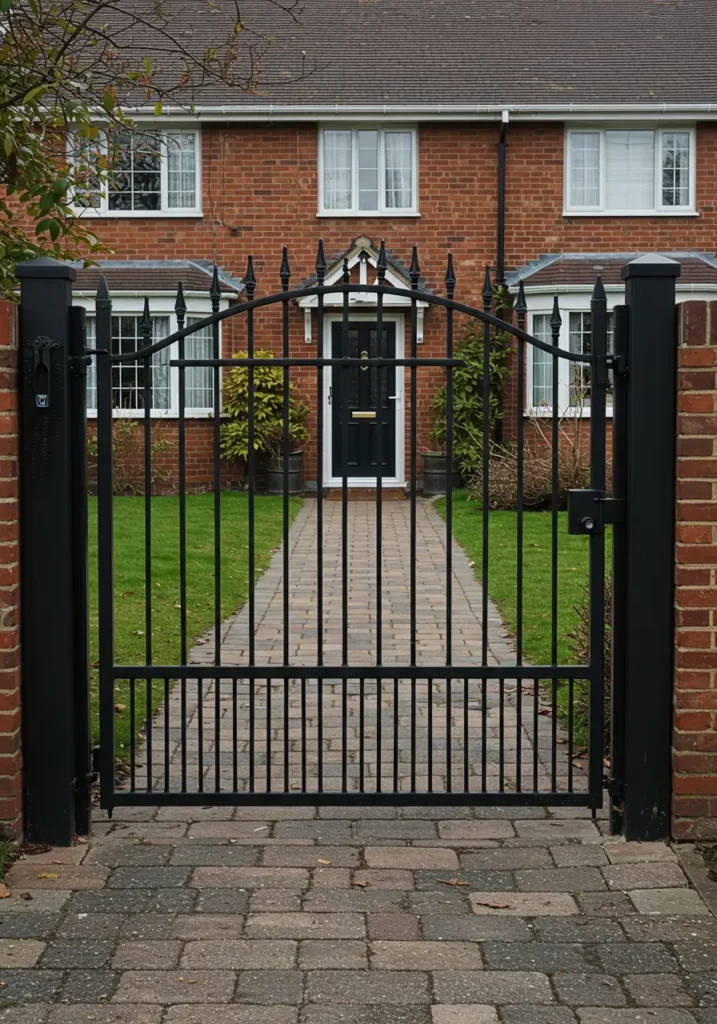
Essential metal gates represent far more than functional necessities securing boundaries and controlling access. They serve as key architectural elements defining your property’s character, enhancing curb appeal, providing security and peace of mind, and ultimately contributing to your property’s value and your enjoyment of your home.
By choosing appropriate materials—typically high-quality steel or aluminum—selecting finishes capable of withstanding Britain’s challenging weather (galvanizing plus powder coating represents the gold standard), picking styles that complement your property’s architecture, ensuring professional installation with proper posts and footings, and committing to basic ongoing maintenance, you make a sound long-term investment that will serve your property reliably for decades.
Whether your priority is robust security for a driveway gate, aesthetic charm in a metal garden gate, protection for vulnerable side passages, or creating welcoming first impressions with pedestrian gates, metal offers solutions meeting all these needs through its versatility, durability, and range of available styles.
The key to success lies in prioritizing quality over price, understanding that proper protective finishes aren’t optional extras but essential requirements, ensuring professional installation, and maintaining your investment through simple regular care. These investments pay dividends through decades of trouble-free service, maintained appearance, and genuine security.
As you move forward with selecting your essential metal gate, remember that this decision affects your daily life, your property’s security, and your home’s character for years to come. Take time to research options, consult reputable suppliers and installers, verify finish specifications match UK weather demands, and don’t compromise on quality to save modest amounts initially. The difference between an adequate gate and an excellent gate is often small in initial cost but enormous in long-term satisfaction and performance.
Now we want to hear from you: What’s the most important factor you’re considering for your metal gate decision—security level, aesthetic style, budget constraints, or maintenance requirements? And what questions do you still have about choosing the right gate for your UK property? Share your thoughts, concerns, and experiences in the comments below—your insights help other readers making similar decisions!
Frequently Asked Questions About Metal Gates UK
How long should a good quality metal gate last in the UK climate?
A well-constructed steel metal gate that has received proper protective treatment—specifically hot-dip galvanizing followed by professional powder coating or high-quality paint systems—can realistically last 30-50 years or even longer in typical UK climate conditions with appropriate maintenance. The key variables affecting longevity include the quality of the protective finish (which is absolutely critical in our damp climate), the gauge and quality of the base metal, whether the gate faces particularly harsh exposure (coastal salt air, industrial pollution, or heavily shaded damp areas accelerate deterioration), and the maintenance regime followed by the owner. Gates receiving annual cleaning, prompt touch-up of any finish damage, and periodic hardware lubrication will significantly outlast gates that are neglected. Conversely, gates with inferior finishes or no galvanizing may show significant rust within just 5-10 years, requiring expensive refinishing or premature replacement. The substantial difference in longevity based on finish quality alone demonstrates why you should never compromise on protective coatings regardless of budget pressures. Quality finishes transform gates from short-term purchases into multi-decade investments. For comparison, aluminum gates naturally resist rust and may last even longer than steel in coastal or particularly damp locations, though their lower strength means they may experience other forms of wear or damage over extended periods. Wrought iron or wrought iron-style steel gates with proper finishes enjoy similar longevity to standard steel gates. The bottom line: prioritize galvanizing and powder coating over aesthetic features if budget requires choices, as protective finish quality determines whether your gate lasts a decade or half a century.
What is the best finish for maximum rust prevention on metal gates in the UK?
The combination of hot-dip galvanizing followed by high-quality powder coating represents the absolute best protection against rust in the UK’s often damp and highly variable climate. This dual-layer approach provides redundant protection that ensures longevity even in challenging conditions. Hot-dip galvanizing works by immersing the fabricated steel gate in molten zinc at approximately 450°C, creating a metallurgically bonded zinc coating that becomes integral with the steel substrate. This zinc layer acts as a sacrificial anode—meaning it will corrode preferentially to protect the underlying steel, even if the coating is scratched or damaged. Properly applied galvanizing meeting BS EN ISO 1461 standards provides 20-30+ years of rust protection on its own. Powder coating applied over galvanizing adds a second protective barrier—a tough, electrostatically applied thermosetting plastic finish that’s cured at high temperature. This creates a hard, durable, weather-resistant topcoat that resists chipping, scratching, fading, and moisture penetration far better than conventional paints. The powder coat protects the galvanizing from environmental exposure while providing attractive, consistent color. The beauty of this layered system is redundancy: if the powder coat is damaged through impact or wear, the galvanizing underneath prevents rust from developing, giving you time to perform touch-up repairs. For areas with particularly severe conditions—coastal locations facing salt-laden air, industrial areas with atmospheric pollution, or heavily shaded damp locations with limited air circulation—this galvanizing-plus-powder-coating combination isn’t just recommended, it’s essential. While quality multi-coat paint systems over galvanized steel also provide good protection, powder coating’s superior durability and chip resistance makes it the preferred choice. Avoid ungalvanized painted gates regardless of paint quality claims—they will rust prematurely in UK conditions, typically within 5-10 years even with good paint. The modest additional cost of galvanizing plus powder coating compared to paint-only finishes pays back many times over through extended gate life and reduced maintenance requirements.
Do I need planning permission to install a metal gate in the UK?
Planning permission requirements for gates in the UK depend on several factors including gate height, location relative to highways, and your property’s designation status. Under current permitted development rights in England, you generally do NOT need planning permission for gates up to 1 metre (approximately 3.3 feet) high installed anywhere on your property boundary, or gates up to 2 metres (approximately 6.6 feet) high if they are NOT next to a highway used by vehicular traffic. These rules cover most pedestrian garden gates and many driveway gates on properties set back from roads. However, you DO typically need planning permission for gates exceeding 2 metres in height in any location, gates over 1 metre high adjacent to highways used by vehicles (which includes most front boundary gates facing public roads), or when installing gates on listed buildings or within conservation areas where permitted development rights are often restricted or removed entirely. Additional restrictions may apply if your property has Article 4 directions limiting permitted development, or for gates fronting classified roads where highway authority approval may be required for visibility and safety reasons. The specific rules vary slightly between England, Scotland, Wales, and Northern Ireland, so always check with your Local Planning Authority (LPA) if you have any uncertainty about your specific situation. Planning departments can provide definitive guidance based on your exact circumstances, property location, and proposed gate specifications. Many suppliers and installers are familiar with local planning requirements and can advise during the specification process, though ultimate responsibility for compliance remains with the property owner. For automated gates, also consider whether building regulations approval is required—complex electrical installations or gates affecting highway safety might trigger building control requirements. When in doubt, a quick phone call or email to your local planning department before ordering gates prevents expensive problems later. Most LPA planning departments are helpful and can quickly confirm whether permission is needed. It’s always better to check first than to install gates and face enforcement action requiring expensive modifications or removal.
Is steel or aluminium better for a metal garden gate in UK conditions?
For a typical UK metal garden gate serving pedestrian access to garden areas, steel with proper protective finishing generally offers the best overall balance of strength, security, aesthetic versatility, and cost-effectiveness. Steel’s superior strength per unit of material allows fabrication of gates that are robust and secure without requiring excessive material thickness, keeping weight and costs reasonable while providing confidence in long-term structural integrity. Steel accepts decorative forming, scrollwork, and detail work well, offering maximum design flexibility whether you want simple modern lines or elaborate traditional ornamentation. The main consideration with steel is ensuring adequate rust protection through galvanizing and powder coating or quality paint systems—but this protection is readily available and standard from reputable manufacturers, so it shouldn’t deter you from choosing steel. Properly finished steel garden gates will last 30-50+ years in typical UK garden settings with basic maintenance. Aluminium’s primary advantages are natural rust resistance (which is valuable in coastal areas facing salt-laden air, or particularly damp, shaded garden locations with poor air circulation) and lighter weight (making installation and daily operation easier). However, aluminium is less strong than steel—to achieve comparable structural integrity, aluminium gates require thicker material or more substantial framework, which increases costs. Aluminium also dents more easily than steel, though it won’t rust. For garden gates where security is secondary to aesthetics and you’re in a challenging rust-prone location, or where you specifically want lighter weight for ease of use, aluminium represents a viable choice. But for most UK garden applications where security still matters and you want maximum design options at reasonable cost, properly finished steel remains the preferred material. The cost difference is also relevant—comparable aluminium gates typically cost 20-40% more than steel equivalents due to material costs. Unless you have specific reasons favoring aluminium (coastal location, very damp conditions, weight concerns), invest in quality-finished steel for the best combination of performance, appearance options, security, and value for typical UK garden gate applications.
What is the typical price range for essential metal gates in the UK market?
Metal gate costs vary enormously based on size, material specifications, finish quality, design complexity, whether standard or bespoke, and whether prices include installation. As rough guidelines for supply-only costs (gates without installation): Simple standard-size pedestrian or metal garden gates from reputable manufacturers typically start from £150-400 for basic galvanized and painted designs in standard sizes (900mm-1200mm width). More decorative or larger garden gates, or those with premium powder coat finishes, might range £400-800. Single driveway gates in standard sizes (3000-4000mm width) with basic galvanized and painted finishes typically cost £500-1200, while pairs of driveway gates (double gates) in the same finish range start around £800-2000. Upgrading to galvanizing plus powder coating adds approximately £200-400+ depending on gate size. More elaborate designs featuring scrollwork, custom colors, or decorative elements increase costs by 20-50% over simple designs. Bespoke gates designed to your specific dimensions and custom design specifications typically command premiums of 30-60% over comparable standard sizes due to one-off manufacturing costs. Automation systems add substantial costs: basic single gate automation kits start around £400-800 for DIY installation, while professional automation installation for double driveway gates with intercoms and safety features typically costs £1500-3500+ depending on complexity, access control features required, and site-specific installation challenges. Heavy-duty estate gates for larger properties, particularly with automation and access control systems, can easily reach £5000-10,000+ for complete supply and installation. Premium materials like genuine wrought iron or specialty finishes command significant premiums. Installation costs typically add £200-500 for simple garden gates, £400-800 for single driveway gates, and £800-2000+ for automated driveway gate systems depending on groundwork requirements, automation complexity, and regional labor rates. London and Southeast typically have the highest installation costs while Northern regions may be 10-20% lower. Get multiple detailed quotes from reputable suppliers and installers, ensuring quotes specify exactly what’s included—material specifications, finish details, hardware, automation components, installation scope, and warranties. The cheapest quote isn’t always the best value if it compromises on crucial elements like finish quality that determine longevity.
How much maintenance do metal gates require in UK weather conditions?
Quality metal gates with proper protective finishes qualify as genuinely low-maintenance in UK conditions, though not completely maintenance-free. The actual maintenance burden depends heavily on finish quality, exposure conditions, and how meticulously you follow basic care routines. For well-finished gates (galvanized plus powder coated), expect to invest 2-4 hours annually on maintenance tasks: Annual or bi-annual washing with mild soap and water to remove accumulated dirt, road film, pollen, bird droppings, and organic growth takes approximately 30-60 minutes per gate depending on size and design complexity. This cleaning prevents contaminants from holding moisture against finishes while keeping gates looking attractive. Quarterly inspections examining finishes for any chips, scratches, or early rust spots take 10-15 minutes—identifying problems early allows quick touch-ups preventing rust spread. Touch-up repairs of any finish damage using manufacturer-supplied touch-up kits might be needed occasionally (perhaps every 2-3 years for gates in good locations, more frequently in harsh conditions or high-traffic areas subject to impacts). These spot repairs take 20-40 minutes including preparation, priming, and topcoat application. Lubricating hinges, latches, and moving parts every 6-12 months requires 15-20 minutes with appropriate lubricants. For automated gates, add monthly safety feature testing (5-10 minutes), seasonal clearing of sliding tracks if applicable (10-20 minutes during autumn leaf fall), and annual professional automation servicing (typically £80-150, takes 1-2 hours but performed by technician). Gates in harsher conditions—coastal areas, heavily shaded damp locations, or areas with atmospheric pollution—may require more frequent washing and more vigilant inspection and touch-up. Compare this modest time investment to wooden gates requiring annual or bi-annual treatment with preservatives, stains, or paints consuming 4-8 hours of labor plus material costs every year or two, and metal’s low-maintenance advantage becomes clear. The key to minimizing metal gate maintenance is specifying quality protective finishes initially—don’t compromise on galvanizing and powder coating to save money upfront, as inferior finishes dramatically increase long-term maintenance burden and potentially require expensive full refinishing or premature replacement. Gates with excellent finishes in good locations might need only basic cleaning and lubrication for decades, while gates with poor finishes require constant attention fighting rust and deterioration. Your initial finish choice determines whether maintenance remains a minor occasional task or becomes a frustrating ongoing battle.

